Arm CEO Rene Haas on Monday downplayed the company’s ambitions to become a chip supplier itself. This was revealed during a lawsuit against Qualcomm. That is a major customer that is estimated to pay Arm hundreds of millions of dollars annually.
This reports Reuters. The heart of the dispute revolves around Qualcomm’s license agreement to use Arm’s intellectual property following Qualcomm‘s acquisition of chip startup Nuvia in 2021 for $1.4 billion.
The remedy Arm seeks in this case is the destruction of Nuvia’s designs. Arm claims that these designs are the basis of the energy-efficient AI PC chips that the Nuvia management team developed for Qualcomm. Microsoft and others expect that these chips launched earlier this year could help the Windows operating system regain ground from laptops made by Apple.
Neutral player
Arm plays a central role in the chip industry by licensing underlying technology to virtually all companies in the industry as a neutral player. The British company claimed Qualcomm was obligated to honor Nuvia’s royalty rates for the chip designs it used in Qualcomm’s chips, rather than pay Qualcomm’s much lower rates.
During the trial this week in a Delaware federal court, documents were shown showing that Nuvia’s royalty rates were “many times” higher than Qualcomm’s. Allowing Qualcomm to pay lower rates would hurt its business model, according to Arm.
Cross-examination
During cross-examination, Qualcomm’s lawyer tried to present the royalty dispute as part of Arm’s strategy to confront a customer it increasingly saw as a competitor. Qualcomm’s legal team showed a document Haas had prepared for Arm’s board of directors. In it, he outlined a strategy for Arm to start designing its own chips, which would put the company in direct competition with Qualcomm and Arm’s other customers.
Haas dismissed these documents as irrelevant. He stated that Arm does not make chips, but that it is always considering various possible strategies. “That’s all I think about, is the future,” he told the eight-member jury.
Qualcomm lawyers also questioned Haas about letters Arm had sent to dozens of Qualcomm customers, including Samsung Electronics. In these letters, Arm warned that the dispute could lead to the forced destruction of Nuvia technology, which went against Qualcomm’s demands.
A Qualcomm lawyer called these letters “misleading,” and many chip industry insiders have questioned whether Arm’s threat of destruction would disrupt Qualcomm’s ability to supply chips to the PC industry. “I felt we had a reason,” Haas said. “We were getting lots of questions from partners and customers at almost every meeting with senior executives.”
Arm is expected to call its final witnesses Tuesday and show video footage of witness testimony before it closes its case. Qualcomm could call its CEO Cristiano Amon. The judge indicated Monday that the jury may begin deliberations as early as Thursday.
